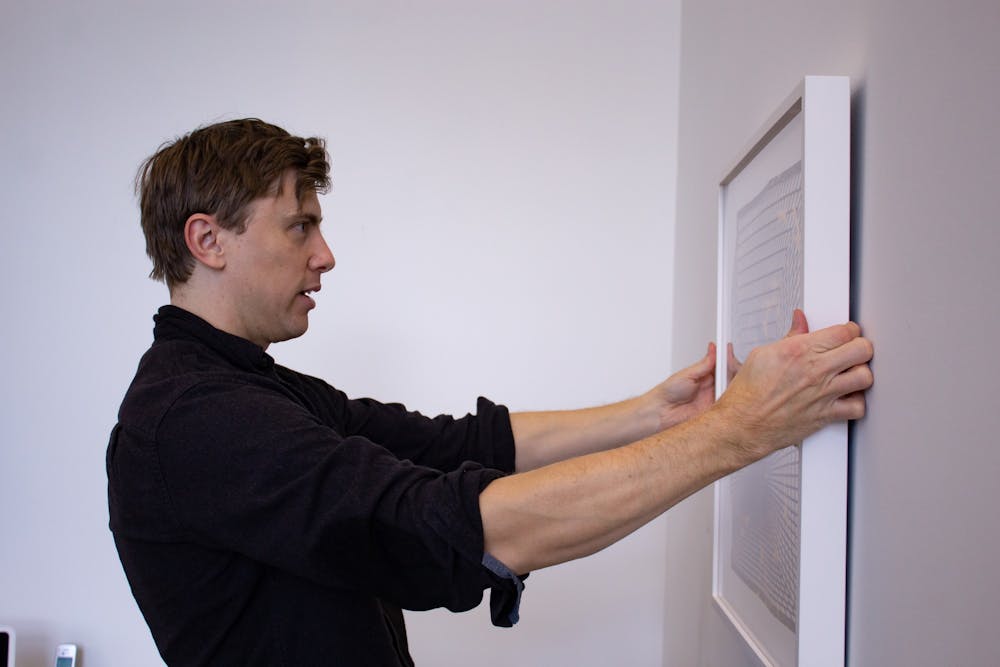Watts said one of the most challenging aspects of being an artist is securing places to showcase his work, which he combats through the creation of his own pop-galleries and art showcase spaces.
“Securing places to even show work is so incredibly hard that it can often feel like you're just creating in a void, even if your intention is not to,” he said.
Watts said one of the ways artists can gather more opportunities to showcase their work is by going to local art openings and familiarizing themselves with the community.
“If you're out talking to people in the local arts community, you can really see all the different vantage points and modes of entry,” Watts said.
Watts said even for non-artists, engaging in the local arts community is incredibly important to keep the arts alive within large museum galleries and small DIY pop-up spaces.
Success is: Remaining self-driven while helping and getting help from other artists
Leigh Suggs, a UNC Bachelor of Fine Arts graduate from 2003, is an artist that primarily utilizes paper for drawing, painting and sculpture.
Over the past 16 years, Suggs has interacted with the arts community in a number of capacities.
Suggs worked for an architecture and interior design firm in Chapel Hill for almost a decade, gaining business and administrative skills that helped her open a studio and pursue art as a full-time career.
“I really didn't think that making art full time was a career until I was about 30,” Suggs said. “It took me a long time to get there. I always thought you had to be an artist and be something else.”
Suggs said her perceptions of success during undergrad relied on good grades and positive professor feedback.
“You make an A, that's successful,” she said.
To get the day's news and headlines in your inbox each morning, sign up for our email newsletters.
Suggs said the real world does not have parameters or prompts — creation relies on the artist and their own perceptions. However, she also said true self-reliance comes from the support of others.
“You need curators, you need art writers and art buyers and art advisers,” Suggs said. “That's a huge part of my own practice and my own philosophy. I've always really wanted to be a connector and a helper.”
Success is: Using art to expand beyond the capitalist model to create larger perspectives
Alyssa Miserendino, a UNC MFA graduate from 2016, produces photography and sculpture installations that integrate physics, sound and psychology. Miserendino received her undergraduate degree from the School of the Art Institute of Chicago in 2006. She then worked as a commercial photographer for more than a decade.
Like Watts, Miserendino’s first reason for attending the program was to receive a master’s so she could teach. Her second reason was that she wanted to expand her artistic expression beyond photography in an academic environment.
“Being given time to just make things, as an artist, that's really important,” Miserendino said. “At that time, it's really important to just make and fail until you arrive at something that makes sense.”
Miserendino said at the beginning of her career as a burgeoning artist, her views on success boiled down to the selling and collection of her work. However, as she progressed in her career, she said she found the commodification of art in gallery spaces only existed for a small number of practicing artists.
With this realization, Miserendino said her work began to travel beyond the bounds of a gallery space as a means of delving into more complex topics.
For example, in Miserendino’s ode to Heisenberg + De Maria (HDM) — an interactive sound installation that tracks the human heartbeat within a 24-hour spatialized amazon sound sculpture — she delves into the concept of non-linear time in relation to incarceration and health.
“My idea of success in art now is how can art be used to expand beyond the current capitalism model that actually creates larger perspectives for those that are experiencing art,” she said. “At the end of the day, I’m just curious about asking questions that elicit further questions.”
Success is: A shifting and changing concept — relative to one’s own experiences
William Paul Thomas, a UNC MFA graduate from 2013, is a painter and videographer working within the realm of naturalism. Thomas attended the program to further develop his artistic practice — deconstructing and studying the foundations of his work.
“It was tremendously valuable for me to have a full two years to focus primarily on making, teaching, studying and deconstructing art,” Thomas said. “That's a unique privilege that I don't take for granted.”
During the program, Thomas worked as the student service specialist in the department of art at UNC. He said working while creating art and maintaining his career become a pillar of his success.
However, Thomas said success as an artist is not one thing.
“Success in the arts community can manifest in different ways," Thomas said. "An artist's efforts can be recognized as being culturally relevant."
Miserendino said these differences in success originate from experience.
“Experience is what allows for our minds to expand, so that we can keep asking questions and that life continues to be interesting," Miserendino said.
arts@dailytarheel.com



